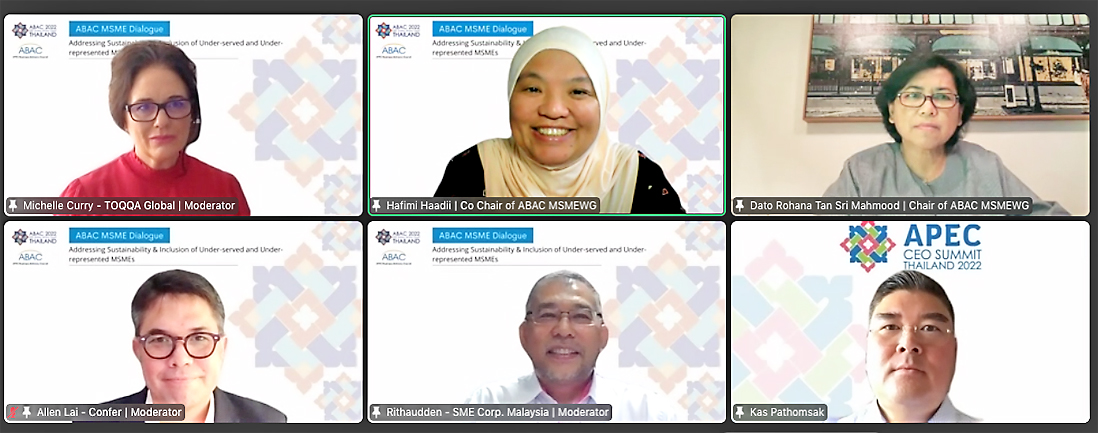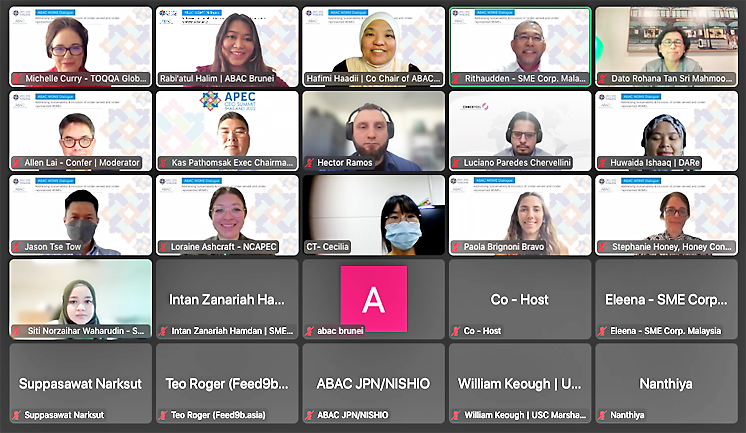Danial Norjidi
The topic of addressing sustainability and inclusion of under-served and under-represented micro, small and medium enterprises (MSMEs) took centre stage in a recent virtual dialogue series co-hosted by the Asia-Pacific Economic Cooperation (APEC) Business Advisory Council (ABAC) Brunei and ABAC Peru.
According to a press statement from ABAC Brunei and ABAC Peru, the dialogue series, held on May 25 and June 2, aimed at engaging with multi-stakeholders from education, government agencies and MSMEs, with over 70 participants across the APEC region participating in the virtual sessions, which looked into areas such as finance, trade, digitalisation, education, sustainable practices and inclusiveness for MSMEs.
The first session of the dialogue series was opened by Brunei representative for the ABAC and Executive Director of LVK Group of Companies Nik Hafimi binti Abdul Haadii, who is a co-chair for the ABAC MSME and Inclusiveness Working Group (MSMEWG).
“During this dialogue we would like to bring the focus of post pandemic recovery efforts specifically within the underserved and underrepresented diaspora and hopes to gather as much insights from the businesses to foster greater economic inclusion and enhance sustainable practices within the MSME economy,” she said.
“The outcome will also be used to develop a pragmatic framework in enhancing the economy’s resilience and to incorporate in the report that is a collaborative effort with USC Marshall School of Business to be presented to the leaders.”
Meanwhile, Chair of the ABAC MSMEWG Dato’ Rohana binti Tan Sri Mahmood highlighted that MSMEs play a crucial role in driving sustainable and inclusive economic development within the Asia-Pacific region.



“In addition, their roles as suppliers, distributors, and even customers across the supply chain provide a means to transform domestic economies into more productive and competitive environments.
“However, their positions as drivers of economic growth have been immensely threatened over the past two years due to disruptions brought upon by the COVID-19 pandemic. Many MSMEs were forced to rely on their limited capacities and reserves just to survive; and those that were less fortunate were forced to close down shop indefinitely. And of course, this impact was felt harshest by the underrepresented and underserved MSMEs, such as those owned by women, indigenous groups, and youth who were already subjected to pre-existing socio-economic stressors.”
“As we enter endemicity, it is now more critical than ever for ABAC to provide pragmatic recommendations to our economic leaders on ways to adequately equip MSMEs to not only survive, but to also thrive in a post-pandemic world. As a clearer picture of the aftermath of the pandemic and its negative impacts on the business community throughout the APEC region emerges, there is greater need, by both the public and private sector, to step up efforts in empowering MSMEs for greater and more resilient participation in the various 21 APEC economies,” Dato’ Rohana added.
Representative of the ABAC Peru and co-chair of the ABAC MSMEWG Julia Torreblanca highlighted the importance of generating a suitable ecosystem for the growth and development of MSMEs, as well as adapting the work and trade framework to all levels of businesses, so that it does not generate greater inequality gaps.
“Integrating aspects of sustainability, inclusion and digitalisation into the global value chain will provide an important space for small and medium sized enterprises (SMEs) led by underrepresented groups to grow and develop under a framework of economic stability that supports the environment in the long term,” said Torreblanca.
The press statement notes that SMEs account for over 97 per cent of all businesses in the APEC region, and they employ over half of the workforce across APEC economies.
It shares that driving economic and social recovery of MSMEs, especially those that are underrepresented and underserved, is vital towards ensuring the continued growth of the region. However, the impact of COVID-19 within different industries and economies has been and remains overwhelming, especially for the underserved and underrepresented groups, which are even more severely affected. This includes the women-owned small businesses, indigenous businesses and the youth group.
ABAC Brunei and ABAC Peru highlighted that these enterprises have suffered huge revenue losses, which is why it is crucial to reboot the growth of the APEC region, especially as the economy has been significantly affected by pandemic related shocks and geopolitical disruptions.
In line with this, the dialogue series featured three breakout sessions focussed on issues of major interest to MSMEs. The first breakout session on ‘Finance and Trade’ focussed on efficient management of international business development plans, microfinance and regulatory environment for new businesses.
This session provided insight on the need to address the trade barriers as well as the NTBs that hamper the development of cross-border, domestic and international supply chains through improving business environments.
“Various toolkits that are suited to the different stages of development that MSMEs are undergoing will be beneficial to provide enterprises the necessary training and encourage them in entering the global supply chain. It is also necessary for capacity building on finance and trade needs to be continuously conducted,” it was shared.
The second breakout session discussed the topic of ‘Digital and Education’ on promoting the use of digital platforms, skills development and public-private partnerships for the mentoring of new businesses.
It was also highlighted that different MSMEs are at different stages of development and that building a strong foundation should be a priority that MSMEs should focus on.
“This is where mentoring plays an important role, being a support to help MSMEs become more resilient, better, and stronger. Investment in ensuring the distribution of the digital platform usage is also important to ensure inclusivity among MSMEs,” said the statement.
“When we develop the various toolkits, we will enable the various APEC economies coming from the public and private sector to assist, mentor and prepare the enterprises at the various stages, coming from the early stage to the global stage. It’s important that we make a continuous effort in education as well.”
The third breakout session focussed on ‘Sustainable Practices and Inclusiveness in MSMEs’ on promoting the development of strategies to strengthen underserved and under-represented MSMEs, ensure more inclusive trade and support the development of sustainable business practices.
According to the statement, it was brought to attention that sustainability is not a priority, as COVID-19 has significantly impacted the lives and livelihoods of MSMEs to the point where they are focussed on MSME survival. It was also highlighted that being climate conscious often leads to higher costs and, given the current challenges faced by MSMEs, makes sustainability not a priority.
“Therefore, it is important for governments to offer subsidies and help with infrastructure if they are to encourage greater adoption of climate friendly practices.”
This series of dialogues is part of the deliverables by ABAC Brunei and ABAC Peru under the ABAC MSMEWG work plan for 2022. The statement added that outcomes and insights generated from these events will serve as input for the recommendations addressed to the MSME ministers and the 21 APEC leaders. It will also serve as support in the following years of work to maintain an effective and continuous work track.








